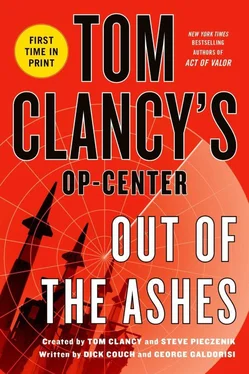He was working to turn things around, but he couldn’t do it if the Saudi oil minister kept summoning him to his office to explain himself. Another beckoning. What now?
“So, Ali,” Nayef began once Al-Wandi was seated in his office. “You told us this was a fail-safe plan. Now we have spent billions and your pipeline is almost complete and we will realize nothing from it!”
“We still can! Don’t you see? Syria is the problem. The government is trying to consolidate power and doing it at our expense.”
“Yes, of course, I see that, you fool!” Nayef shouted. “You said you could take care of that, but clearly you can’t.”
“I’ve used all the resources I could lay my hands on, but the Syrian government won’t budge. There’s no way I could have anticipated this when we started the project. Now we have no choice but to attack them and force them to let us complete our pipeline,” al-Wandi continued. “We’ve paid the Americans tens of billions of dollars for the best military technology we could buy. If we strike while the current Syrian government is still trying to consolidate power, we should be able to reverse this setback. The new Syrian leaders know nothing about how to use their military. They’ll sue for peace soon after we begin our initial attacks.”
Nayef looked at al-Wandi as if he’d been shot. “Now, wait a minute. Don’t underrate the Syrians. We both know their military is vastly superior to ours,” Prince Nayef retorted. “If we attack them, not only will they repulse our forces, they could well attack our oil fields, and then where would we be?”
“Our military has the strength to prevail against the Syrians,” Al-Wandi persisted. The heated debate raged on, with Nayef and Prince Ali trading point and counterpoint. Finally, al-Wandi played his trump card.
“What if the Americans were to help us with this?”
Nayef was caught off guard. “What do you know that I do not?”
“I know the Americans are not happy with things in Syria. What if they were to become even unhappier?” al-Wandi asked furtively.
“Well, that would be to our advantage, but I can’t worry about what the Americans may or may not do, and I don’t think you should worry about that, either.”
“I think there is a way to do this!” al-Wandi replied.
“Look, Ali, we’re not getting anywhere with this discussion. I don’t want to hear any more talk about our nation attacking Syria. Understood?”
“Yes, as you wish,” al-Wandi replied as he left Nayef’s office.
Ali was seething as he always was when he met with Nayef. Yet he knew the oil minister had a point. While Saudi Arabia possessed a great deal of modern weaponry, most of it courtesy of the United States and the result of a US$60 billion purchase order put in place while the Mideast revolutions were occurring in 2011, it was still not as strong as Syria militarily on the ground. They had the technology, but not the ground combatants. The Syrians had been hardened by years of fighting. They would swarm over the border and make straight for the Saudi capital. The kingdom could be crushed if it went to war with Syria. Their only chance, Ali al-Wandi reasoned, would be if Syria were somehow weakened militarily in a substantial way.
* * *
After al-Wandi departed, Nayef sat at his desk, deep in thought. What does al-Wandi know that I don’t? Have I let him have too much power? Where was this talk of war coming from?
Price Nayef thought about it for a bit longer. He recognized Ali al-Wandi was an emotional man, while he himself was more clearheaded. He had told the so-called oil czar what to do and that was that. I will just watch him more carefully now .
* * *
Back in his office, al-Wandi knew he had but one course of action. Now I must have the Americans attack Syria.
Ali had spent many months working furiously, but surreptitiously, to ensure his dream did not slip away, and now he would redouble his efforts. Syria had to be weakened enough so Saudi Arabia could attack and be assured of winning a war. Or if that couldn’t happen, at a minimum, the current Syrian government needed to be decapitated, eliminating those who opposed completion of the pipeline. Only then could al-Wandi complete the pipeline and gain the unrestricted access to the Mediterranean Saudi Arabia needed. He had pulled together a plan that could work, that should work. Now all he had to do was to wait for the Americans to react, but he could only wait so long.
* * *
Far to the west of where Prince Ali was trying to salvage his plan and his fortune, USS Normandy wallowed in the quartering sea. Captain Pete Blackman, Normandy ’s commanding officer, sat in bridge chair, his patience wearing thin. Rain pelted the bridge’s overhead and the windshield wipers on the bridge’s thick, laminated, glass windows moved back forth almost spastically, but unsuccessfully, trying to push the water away. Normandy ’s bow floundered in the confused seas, forcing the ship’s head to vary as much as fifteen degrees from base course, and no one seemed to notice, or care. At least no one seemed to care but Blackman. He looked at the ship’s nineteen-year-old helmsman and mustered some semblance of a smile.
“Son, I would appreciate it if you would hold a steady heading, and I know the inbound helo pilots would appreciate it also.”
The young sailor grinned and responded, “Aye, aye, Captain, steady as she goes.” The old man might be demanding on his department heads and be a bit rough with his junior officers, but he had a soft spot in his heart for his enlisted sailors.
Blackman sat in his leather-covered captain’s chair, leaning against Normandy ’s crest, stitched into the back of the seat cover. The crest featured a lion, an anchor, and other military symbols commemorating the Battle of Normandy, as well as the ship’s motto, Vanguard of Victory, a motto Blackman had adopted as his personal slogan. He surveyed the officers and sailors making up the bridge watch team as they swayed from side to side, fighting to maintain their balance on the bridge’s steel deck as the ship rolled in heavy seas. Yes, they are improving, he had to admit to himself, but they are still a long way from where they need to be, especially going into a potential combat zone .
As the young seaman fought to hold the ship on a steady heading, Blackman watched the flight deck TV monitor suspended from the bridge’s matte-black overhead. The monitor showed the helo pilot fighting to bring his H-60 aboard Normandy ’s gyrating flight deck. Above him and to his right, the voice of his landing safety officer blared from the red speaker as he tried to coax the helo onto the deck.
“XO!” he shouted to his executive officer. “We’ve been at flight quarters for over an hour and a half taking helos the carrier is sending our way. How much longer is this going to last?”
“Once the bird over our deck lands and takes off, our helo will be back here in about a half hour. Then we have one more bird from Truman landing here just before sunset. That final helo has a part for our gyrocompass, the last part we need to fix it,” his XO replied, hoping some kind of good news would help ease Blackman’s frustration over the way his bridge team was handling the ship.
“Great … and it’s about time! What the hell are we paying those supply weenies for anyway?” Blackman groused to no one in particular.
His exec knew Blackman was always demanding. Now, with this new Mideast crisis brewing, he knew his captain could almost taste launching salvos of Normandy ’s Tomahawk missiles at a new enemy. The U.S. Navy had pounded Libya with hundreds of Tomahawks in the spring of 2011, and Blackman was deskbound in a Pentagon job then. Now it was his turn.
Читать дальше












